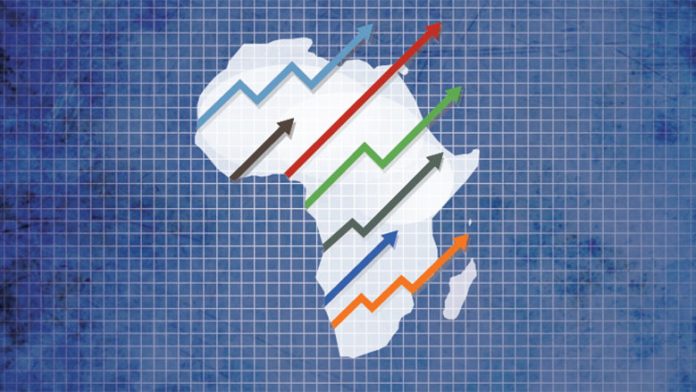The Institut Montaigne publishes a series of substantiated recommendations in the face of the pandemic emergency. It wants to support French companies, but not only them, in their role of reviving African economies.
There is little doubt that Africa will be deeply affected by the Covid-19 pandemic, observes the Institut Montaigne in a conjuncture note. If this is not directly from the importance of the epidemic on its soil, the continent will suffer from the global slowdown, the decline in tourism and industrial activities, as well as the decline in commodity prices.
This is why the French “Think Tank”, of liberal inspiration, is issuing a series of recommendations to companies investing in Africa, especially mid-sized ones, as well as to French and African states and administrations.
Thus, the Institute notes, for example, that French expatriates did not have the reflex to leave, in part due to the simmering health threat. On the contrary. “The increase in the number of business travelers to Africa reflects the desire of companies to quickly resume links with the continent.”
Maintaining staff on site also demonstrates the anticipation of these companies for a resumption of activity as quickly as possible. It is therefore essential to promote and facilitate the reopening of flights to and from Africa – at least the main hubs such as Casablanca, Abidjan, Addis Ababa, Johannesburg – as quickly as possible for business trips.
The Institut Montaigne pleads, on this point, for a “clarification” from the French authorities and close intra-African collaboration, due to the frequent stopovers for these flights.
Faced with food insecurity and supply difficulties, the Parisian think tank calls for the establishment of policies for major infrastructure projects (logistics, storage, traceability, supply).
In this context, the simplification of standards – for example, giving preference to private contracts rather than calls for tenders, in the face of urgency – and the simplification of administrative procedures are necessary. Of course, we must not abandon the traditional circuits on which many farmers depend.
Current mechanisms are too slow!
The Institut Montaigne pretends to be surprised that French companies and cooperation do not support African companies producing single-use masks or fabric masks. Like those made in Morocco.
The dynamism of the companies and NGOs mobilized in the manufacture and distribution of masks makes it all the easier to target producers who could be the subject of such initiatives. In Abidjan, for example, a company pledged to distribute a million masks.
France could also contribute more to the financing of small infrastructures such as small electricity production centers responsible for supplying energy to care units, in Nigeria and elsewhere.
“A central question for French companies is to know if and how they will be able to position themselves on funded projects, knowing that in the medium term, funding will probably focus on infrastructure.” The support of organizations like AFD (French Development Agency) seems slow to respond to the emergency on this point.
Of course, responding to the emergency must be accompanied by sustainable stimulus measures for African economies. On this point, the Institut Montaigne, like others, recommends better formalization of the economy and better governance through digitization, which the crisis has prompted certain administrations to adopt.
Africa must acquire safer solutions in terms of food security and distribution, argues the Think Tank, which cites as an example … Rungis, the imposing wholesale market in the suburbs of Paris. Which offers “interesting solutions, particularly in terms of preserving the cold chain, which could be adapted to the realities of Africa”.
This is also why the African countries, supported by France, must provide an exceptional post-crisis guarantee mechanism, affordable for the launch of already mature projects, in order to derisk investments.
For the Institut Montaigne, supporting businesses also requires fairer taxation. Beware of “confiscatory” measures, which the private sector must guard against. The reduction in the share of the informal sector, which increases the tax base, is part of this logic.
In terms of recovery, “sectors are to be favored”, such as digital and food, “while making the energy sector a central axis because it is inseparable from all the others”. In this context, the note recalls, “the energy transition constitutes a huge opportunity for the African continent”.
Money shouldn’t just go to big companies!
The same is true of the efforts made by administrations in favor of digital, “an asset on which to build for economic recovery”. Concretely, it is essential to give priority to a public-private articulation based on the facilitation of private investment through public guarantees.
The resumption of trade between Africa and Europe must be organized, so that investments do not go only to large groups. Finally, on a more institutional level, the Institut Montaigne advocates the creation of a European Commissioner for Africa as well as reciprocity within the African Union.
In terms of recovery, “sectors are to be favored”, such as digital and food, “while making the energy sector a central axis because it is inseparable from all the others”. In this context, the note recalls, “the energy transition constitutes a huge opportunity for the African continent”.
Money shouldn’t just go to big companies!
The same is true of the efforts made by administrations in favor of digital, “an asset on which to build for economic recovery”. Concretely, it is essential to give priority to a public-private articulation based on the facilitation of private investment through public guarantees.
The resumption of trade between Africa and Europe must be organized, so that investments do not go only to large groups. Finally, on a more institutional level, the Institut Montaigne advocates the creation of a European Commissioner for Africa as well as reciprocity within the African Union.

